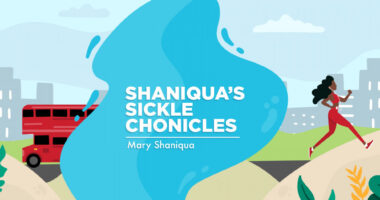My Journey to Self-acceptance With Sickle Cell

Advocating for the sickle cell disease community means drawing on my experiences to help communicate the issues its members are facing, and to attract, engage, and educate a general audience. But this takes a toll on me, as many of my memories are unpleasant and traumatic.
Even so, I continue to do what I can by sharing everything — the lows, the highs, and the in-betweens. The personal toll has diminished with time, and I recently realized that I am in awe of how far I have come as a person. I credit this to my journey toward self-acceptance, which has taught me that the parts I’ve kept hidden are significant to who I am.
Some years ago, I was asked to write about my experience with sickle cell and my work in a hematology lab that was doing a sickle cell project. I was honored to be asked, but when I completed the piece, I realized that people would know about my condition after reading it. The thought terrified me, so I didn’t share the article with anyone.
As I look back on what I wrote, I can see that, despite my insecurities, I tried to be motivational. I wrote, “It is internal; a genetic disorder; part of the genetic make up; a silent battle all the time, but you continue to fight. Don’t let it get you down because life is not without burdens.”
That last line in the article was directed at myself, as well as others. Sickle cell did get me down — to the point that I tried to hide it. After each crisis, I would withdraw and become quieter. Eventually, I recovered, but it was easier to stay in the solace of my own safe space. Others couldn’t judge me if they didn’t know what was wrong with me.
Self-acceptance, one day at a time
I always worried what the world would say to me if they knew what I was going through. As a young black man from South London, I prioritized other battles with identity and acceptance. I felt I needed to fit in, look the part, and do what everyone else was doing. I thought the world would never truly accept my skin color or class, let alone a poorly understood chronic condition.
Ultimately, I was pushed uncomfortably onto platforms where I shared my story with sickle cell. (Thank you to my support network!) Every time I did this, I became more accepting of this part of myself. Each piece I had locked away was released, allowing me to be whole. I was finally being true to myself.
The strength to get out of bed to take my medication, the determination to get better, the ability to cling to positive moments of relief — I had locked away all of these positive traits when my condition was hidden. By embracing myself entirely, those positive traits filtered into all aspects of my being.
When the world feels like too much, I have the strength to stand, the determination to continue, and happy moments to recall. Being able to fully accept myself has meant that I can now stand confidently among my peers. I no longer want to simply exist in the comfort of my safe place, withdrawn from the world.
I choose to accept myself and live the life I want to live without being shackled by what I think society thinks. I’m on a journey toward embracing my true self, and I’m in awe of who I’m becoming.
Note: Sickle Cell Disease News is strictly a news and information website about the disease. It does not provide medical advice, diagnosis, or treatment. This content is not intended to be a substitute for professional medical advice, diagnosis, or treatment. Always seek the advice of your physician or other qualified health provider with any questions you may have regarding a medical condition. Never disregard professional medical advice or delay in seeking it because of something you have read on this website. The opinions expressed in this column are not those of Sickle Cell Disease News or its parent company, Bionews, and are intended to spark discussion about issues pertaining to sickle cell disease.








Leave a comment
Fill in the required fields to post. Your email address will not be published.